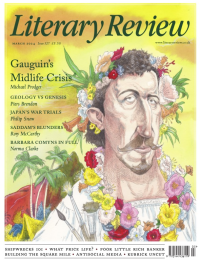Mark Galeotti
Comedian Who Got Serious
The Showman: The Inside Story of the Invasion That Shook the World and Made a Leader of Volodymyr Zelensky
By Simon Shuster
William Collins 384pp £22
As someone who has to consume quite a lot of Russian media, I can tell you that if there is one common denominator, it’s that whether we’re talking about a shouty TV news programme (less Newsnight, more a kind of geopolitical Jeremy Kyle Show), a stodgy government newspaper of record or a racy tabloid, no one has a good word for Volodymyr Zelensky. Of course, they have lots of bad words for him: neo-Nazi, NATO puppet, drug addict, Führer and so on. On one level, this is wholly understandable given the war that is raging and Zelensky’s unexpected and startling metamorphosis from comedian to global icon. However, it probably also reflects what I suspect is a genuine incapacity on the part of Vladimir Putin, in many ways the one-man audience for all these media, to understand his Ukrainian counterpart.
Putin is a grey man, while Zelensky’s whole career has involved chasing the limelight. Putin – in spite of his macho public persona and his invasion of Ukraine, which he thought would be a pushover – is ultimately risk-averse. Zelensky is a man who pushes himself through fear until it becomes fun. Putin doesn’t believe that Ukraine really exists, while Zelensky has essentially become an avatar of the country and its global champion. Underlying all this is the fact that Zelensky is not just a native Russian speaker but someone who, following Putin’s annexation of Crimea in 2014, actually spoke out against the banning of Russian shows and artists in Ukraine. To Putin, who thinks that Ukrainians should actively want to be bound to Moscow and who is known for holding a particular animus for those he considers ‘traitors’, that makes Zelensky more damnable than if he were a bred-in-the-bone Ukrainian chauvinist.
This fast-moving and readable biography of Zelensky by Simon Shuster, a senior correspondent at Time magazine, contains a wealth of unexpected anecdotes that take us beyond the usual summaries of Zelensky’s rise and illuminate the complexities of the Russia–Ukraine relationship. In 1997, his big break came in a TV comedy

Sign Up to our newsletter
Receive free articles, highlights from the archive, news, details of prizes, and much more.@Lit_Review
Follow Literary Review on Twitter
Twitter Feed
Under its longest-serving editor, Graydon Carter, Vanity Fair was that rare thing – a New York society magazine that published serious journalism.
@PeterPeteryork looks at what Carter got right.
Peter York - Deluxe Editions
Peter York: Deluxe Editions - When the Going Was Good: An Editor’s Adventures During the Last Golden Age of Magazines by Graydon Carter
literaryreview.co.uk
Henry James returned to America in 1904 with three objectives: to see his brother William, to deliver a series of lectures on Balzac, and to gather material for a pair of books about modern America.
Peter Rose follows James out west.
Peter Rose - The Restless Analyst
Peter Rose: The Restless Analyst - Henry James Comes Home: Rediscovering America in the Gilded Age by Peter Brooks...
literaryreview.co.uk
Vladimir Putin served his apprenticeship in the KGB toward the end of the Cold War, a period during which Western societies were infiltrated by so-called 'illegals'.
Piers Brendon examines how the culture of Soviet spycraft shaped his thinking.
Piers Brendon - Tinker, Tailor, Sleeper, Troll
Piers Brendon: Tinker, Tailor, Sleeper, Troll - The Illegals: Russia’s Most Audacious Spies and the Plot to Infiltrate the West by Shaun Walker
literaryreview.co.uk